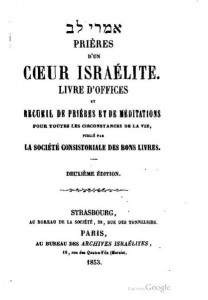

Join us in creating a faithful digital transcription of אמרי לב Imrei Lev: Prières D’un Cœur Israélite (second expanded edition, by Rabbi Arnaud Aron & Jonas Ennery, 1853). This collection of prayers served as the basis for English translations by Hester Rothschild and Isaac Leeser.
Collaborative transcription is taking place on French Wikisource. (If you would like to take part in this transcription, please register a user account on Wikisource.)
After transcription and proofreading, this new digital edition will need to be encoded in TEI XML and archived in the Open Siddur database. The edition will be shared under a Creative Commons Zero (CC0) Public Domain dedication.
TOGGLE COLUMNS (on/off):ADJUST COLUMN POSITIONS: select the column header cell and drag it where you want. show me!COPY INDIVIDUAL COLUMN(S): use CopyTables, a browser extension.
Source (French) Translation (English)
Le grand-rabbin
du Consistoire du Bas-Rhin,
Arnaud Aron.
The Grand-Rabbi
of the Consistory of the Lower-Rhine,
Arnaud Aron
TOGGLE COLUMNS (on/off):ADJUST COLUMN POSITIONS: select the column header cell and drag it where you want. show me!COPY INDIVIDUAL COLUMN(S): use CopyTables, a browser extension.
Source (French) Translation (English)
Le Grand-Rabbin du Consistoire central,
Marchand Ennery.[3] Marchand Ennery was the Chief Rabbi of Paris and Brother of the Jonas Ennery.
TOGGLE COLUMNS (on/off):ADJUST COLUMN POSITIONS: select the column header cell and drag it where you want. show me!COPY INDIVIDUAL COLUMN(S): use CopyTables, a browser extension.
Source (French) Translation (English)
(29 Kislew 5613).
Le grand-rabbin
du Consistoire du Bas-Rhin,
Arnaud Aron.
Notes
| 1 | Arnaud Aron here uses the term, allemand corrompu, “corrupt German.” |
|---|---|
| 2 | A reference, I think, to Stunden der Andacht fur Israeliten zur Beförderung religiösen Lebens und häuslicher Gottesverehrung (Hours of Devotion for Israelites for the Promotion of Religious Life and Domestic Worship), published in 1833 and 1834 by the rabbi and educator Isaak Heß and Samson Wolf Rosenfeld in Württemberg. |
| 3 | Marchand Ennery was the Chief Rabbi of Paris and Brother of the Jonas Ennery. |

“📖 אמרי לב (Imrei Lev) Prières D’un Cœur Israélite, a collection of paraliturgical prayers and teḥinot in French by Jonas Ennery & Rabbi Arnaud Aron (1848/53)” is shared through the Open Siddur Project with a Creative Commons Public Domain Dedication 1.0 Universal license.










Comments, Corrections, and Queries